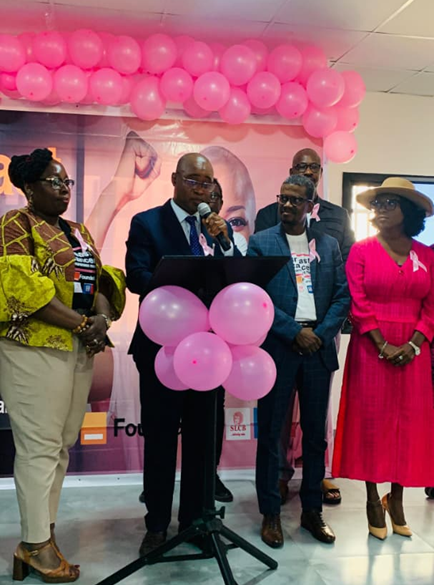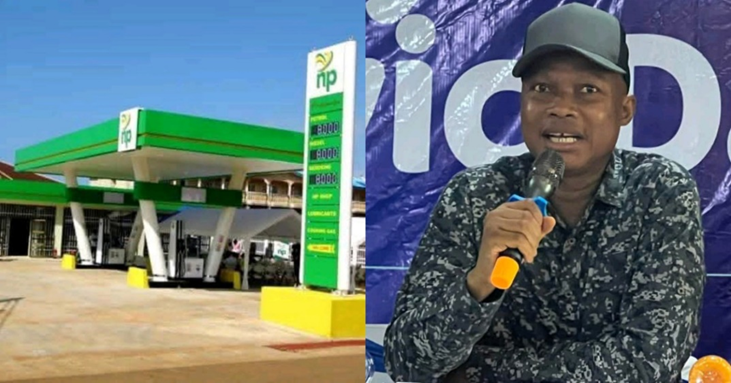By Yusufu Abu Sesay
The Sierra Leone Commercial Bank (SLCB), the nation’s leading financial institution, has reaffirmed its commitment to corporate social responsibility with a donation of $27,500 to the Orange Foundation Sierra Leone in support of a month-long breast cancer awareness campaign.
The campaign, which runs throughout October, aims to raise national awareness about the importance of early detection, timely treatment, and prevention of breast cancer.
Speaking at the launch ceremony, Madam Olayinka Philips, SLCB’s Director of Audit, underscored the importance of partnership in addressing public health challenges.
“It is an honour to stand with the Orange Foundation Sierra Leone in launching this vital initiative — Breast Cancer Awareness Month 2025. Cancer is not just a global health issue; it is a deeply personal one,” she said.
Citing the World Health Organization, Madam Philips noted that only five out of 47 African countries have organized national screening programmes, meaning many women are screened only by chance — often too late.
“While survival rates in high-income countries exceed 90%, in many African nations they remain far lower. Closer to home, nearly 3,000 women lost their lives to cancer in Sierra Leone in 2020, with breast cancer being the leading cause,” she added.
Madam Philips further announced that SLCB’s donation will cover half the cost of a new mammogram machine, a critical tool for early detection.
“As the People’s Bank, our commitment is not just a duty — it is an investment in health, dignity, and empowerment,” she said, noting that all female SLCB staff will have access to screening and counselling as part of the initiative.
Orange Foundation Commends SLCB’s Support. The Chief Executive Officer of Orange Sierra Leone and Chairman of the Orange Foundation, Sekou Amadou Bah, expressed profound gratitude to SLCB, describing the partnership as “life-saving.”
“Our journey in breast cancer awareness began in 2015 with a simple but powerful belief — no woman should die from a disease that can be detected early and treated effectively,” he stated.
He revealed that in 2024, Orange Foundation screened 1,400 women nationwide, identifying 11 abnormalities, with seven women undergoing successful surgery. This year, the Foundation aims to screen 2,500 women across Sierra Leone.
Mr. Bah emphasized that over 70% of breast cancer patients at Connaught Hospital are diagnosed at a late stage, resulting in preventable deaths.
“This campaign is about breaking barriers — bringing free screening to communities, educating women, and encouraging early action. We thank SLCB for walking this path with us,” he concluded.
Health Ministry Endorses the Initiative…Representing the government, the Deputy Minister of Health I, Dr. Charles Senesie, commended both SLCB and the Orange Foundation for supporting national health priorities.
“Women’s health is at the heart of our development agenda. Our vision is that by 2038, Sierra Leone will record zero preventable maternal deaths. The fight against breast cancer is part of that broader commitment,” he said.
Dr. Senesie urged continued collaboration to improve early diagnosis and access to modern screening infrastructure.
Medical Experts Call for Early Detection. Dr. Isaac Smalle, Surgical Oncologist at Connaught Hospital, delivered a brief lecture on the causes, risk factors, and treatment of breast cancer. He highlighted the need for public education on prevention and early screening.
“Women should promote breastfeeding, reduce alcohol intake, avoid smoking, and seek medical attention promptly for any abnormalities,” he advised.
Dr. Smalle also identified financial barriers, limited diagnostic facilities, and cultural beliefs as key challenges and expressed appreciation to SLCB and the Orange Foundation for their support in raising awareness and saving lives.
In the midst of this a Joint Commitment to Saving Lives was echoed by all parties present.
The Sierra Leone Commercial Bank and the Orange Foundation Sierra Leone have pledged to sustain their partnership through continued awareness campaigns, free screenings, and support for patients and survivors — reinforcing hope for women and families across the country.



